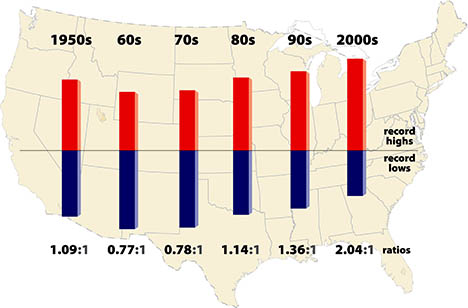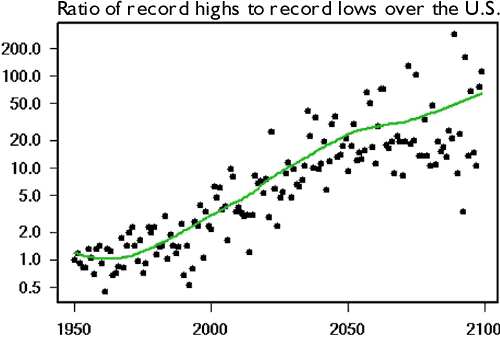Monckton Myth #9: Monckton vs Monckton on heat waves
 It can be difficult debunking misinformation that contradicts itself. The problem is the shifting of goal posts presents a moving target. You could rebut one part of a person's argument and find yourself agreeing with them in another part. On the other hand, for a glass-half-full person, this lack of internal consistency might be seen as a useful resource. Why bother contradicting misinformation when the author contradicts himself. For example, in Monckton Skewers Steketee, Monckton presents a muddled series of thoughts on why climate change has nothing to do with extreme weather events. When talking about record hot weather, Monckton points out that while heatwaves happen, so too do cold snaps:
It can be difficult debunking misinformation that contradicts itself. The problem is the shifting of goal posts presents a moving target. You could rebut one part of a person's argument and find yourself agreeing with them in another part. On the other hand, for a glass-half-full person, this lack of internal consistency might be seen as a useful resource. Why bother contradicting misinformation when the author contradicts himself. For example, in Monckton Skewers Steketee, Monckton presents a muddled series of thoughts on why climate change has nothing to do with extreme weather events. When talking about record hot weather, Monckton points out that while heatwaves happen, so too do cold snaps:
"...some very spectacular cold-weather records were also broken both in early 2010, when all 49 contiguous United States were covered in snow for the first time since satellite monitoring began 30 years ago, and in December, which was the coldest final month of the year in central England since records began 352 years ago."
For a rebuttal, I'll pass you over to Monckton:
"Cherry-picking individual extreme-weather events that point in one direction only, when there are thousands of such events that also point in another direction, is neither sound science nor sound journalism."
Sage advice. The best approach is to look at all the evidence. For example, a perusal of all extreme hot or cold weather events in USA (Meehl et al 2009) find that there were double the amount of record highs compared to record lows in the last decade. 
Figure 1: Ratio of record daily highs to record daily lows in the 48 contiguous United States from January 1950 through September 2009. Each bar shows the proportion of record highs (red) to record lows (blue) for each decade.
So Monckton may be onto something here - always look at the full body of evidence, not just cherry picked data. But what is the significance of this increase in record high temperatures? Monckton argues that global warming has very little to do with hot-weather:
"...neither the hot-weather nor the cold-weather extremes of 2010 have much to do with manmade “global warming”; like the heatwave of 2003 in Europe that is said to have killed 35,000 people, they are known to have been caused by an unusual pattern of what meteorologists call “blocking highs” – comparatively rare areas of stable high pressure that dislodge the jet-streams from their usual path and lock weather systems in place for days or sometimes even months at a time."
But then, a little later on, Monckton argues that the long-term warming trend does have an effect on the increasing number of heat waves:
"Since there has been some warming, more hot-weather than cold-weather records have been set. Not exactly surprising, and not exactly alarming either: for the mere fact of warming tells us nothing about the cause of the warming."
So the goal posts shift from "global warming doesn't affect weather" to "global warming affects weather but humans aren't causing global warming". In fact, according to Monckton, the influence of global warming on record highs is not even surprising. It may have been a surprise to those reading Monckton's article who found themselves agreeing with his earlier points.
At this point, one may experience a crisis of confidence in Monckton as a reliable source of information. Which Monckton do we believe? I tend to gravitate towards peer-reviewed science, which undergoes more rigorous scrutiny before being published than a blog post on Watts Up With That. On the subject of heat waves, Meehl et al 2009 predicts that the U.S. ratio of record highs to record lows are projected to continue to increase to a ratio of about 20 to 1 by 2050 and roughly 50 to 1 by 2100.

Figure 2: Predicted yearly ratio of record highs to lows (top panel) to the end of the 21st Century.Posted by John Cook on Tuesday, 8 February, 2011
 It can be difficult debunking misinformation that contradicts itself. The problem is the shifting of goal posts presents a moving target. You could rebut one part of a person's argument and find yourself agreeing with them in another part. On the other hand, for a glass-half-full person, this lack of internal consistency might be seen as a useful resource. Why bother contradicting misinformation when the author contradicts himself. For example, in Monckton Skewers Steketee, Monckton presents a muddled series of thoughts on why climate change has nothing to do with extreme weather events. When talking about record hot weather, Monckton points out that while heatwaves happen, so too do cold snaps:
It can be difficult debunking misinformation that contradicts itself. The problem is the shifting of goal posts presents a moving target. You could rebut one part of a person's argument and find yourself agreeing with them in another part. On the other hand, for a glass-half-full person, this lack of internal consistency might be seen as a useful resource. Why bother contradicting misinformation when the author contradicts himself. For example, in Monckton Skewers Steketee, Monckton presents a muddled series of thoughts on why climate change has nothing to do with extreme weather events. When talking about record hot weather, Monckton points out that while heatwaves happen, so too do cold snaps: 


